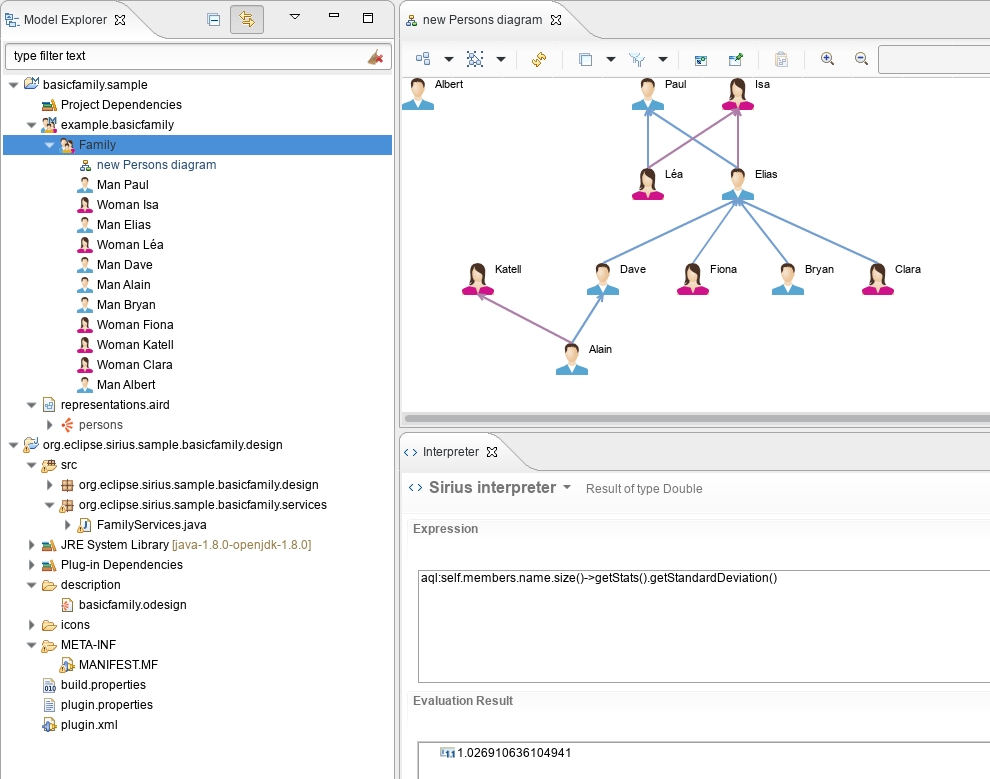The Acceleo Query Language implementation has been announced in August and is the recommended interpreter starting with Sirius 3.1. As we prepare the Eclipse Mars.2 release I’d like to take a few minutes to share a few of the niceties AQL brings beside the raw performance. This is not an exhaustive list.
A language extensible using Java Methods
The whole language execution semantic is defined through Java methods.
aql:self.someMethod()
When the . separator is used, the type of the current variable is used to retrieve the appropriate method.
Even the operators are actually mapped to a Java method, the following expression :
aql:1+3
will call the method “add”:
public Integer add(Integer a, Integer b) {
...
}In the case of the ->separator, the method is to be applied on the collection itself:
aql:self.eContent()->size()
This is all optionaly defined, so if you want to build your own query language with different choices for operators or the standard library you can fairly easily create an empty query environment:
IQueryEnvironment env = Query.newEnvironment(xRefProvider, rootProvider); // instead of Query.newEnvironmentWithDefaultServices(xRefProvider,rootProvider)And then register your classes bringing these methods :
env.registerServicePackage(YourOwnVersionOfEObjectService.class);1<->1 mapping with Java classes
With AQL you are not limited to “returning the standard types the language know about”. This is especially useful when you want to return something which has a bit more structure than a primitive type. Let’s say you want to do a bit of statistic on your model. You can write a service like this, here making use of the Apache Common Math library :
public DescriptiveStatistics getStats(Collection<Integer> iList) {
DescriptiveStatistics stats = new DescriptiveStatistics();
for (Integer integer : iList) {
stats.addValue(integer.doubleValue());
}
return stats;
}And then define other services which are applicable on the DescriptiveStatistics instances :
public double getMean(DescriptiveStatistics stat) {
return stat.getMean();
}
public double getVariance(DescriptiveStatistics stat) {
return stat.getVariance();
}
public double getStandardDeviation(DescriptiveStatistics stat) {
return stat.getStandardDeviation();
}
public double getPercentile(DescriptiveStatistics stat, Double p) {
return stat.getPercentile(p);
}You have to explicitely decide which of the methods of the DescriptiveStatistics class will be exposed, by default AQL will not expose any.
Once you did that you can start querying your model, here let’s see what is the standard deviation of the length of a family first names:

Embedded documentation
You can specify your service documentation directly alongside the Java method so that the code completion can expose it to the user.
To do so you need to use the annotation Documentation which is in the org.eclipse.acceleo.annotation plugin.
We can extend the getStats() with an annotation as such :
@Documentation(
value = "Returns a dataset suitable for statistic queries",
params = {
},
result = "The dataset instance which can be queried..",
examples = {
@Example(
expression = "self.members.name.size()->getStats()",
result = "DescriptiveStatistics{...}"
)
}
)And the code assist will pick up this information

Unification of type literals
Type literals used to be handled specifically in the grammar in the first versions of AQL. We had to do this required because of the JustSomeType syntax which we supported at first.
Once we decided to drop this support and make the type prefix mandatorysomeEPackage::JustSomeType, then we could make sure AQL would handle the type literals just like any other type.
Things like aql:self.eAllContents(self.eClass()) are now possible and will return all the children of type compatible with “self”.
Furthermore if you need a type literal as a parameter in your own service, you just have to have a first parameter with the type : Set<EClass>. Yes, that’s an important point, any type in AQL is possibly a union of several existing types, hence the collection here.
As such the syntax for creating Sets or collections can be used as a substitute for type literals.

Type inference at validation time
AQL is designed to apply no check during evaluation but instead capture errors if there are some. On the other hand we added pretty strong verifications at validation time and now also provide type inference based on predicates result.
Starting with the version 4.0, Sirius can leverage this type inference to be more precise in the type of the variables within an If block for instance. See the following example :

Introducing this capability means the user doesn’t have to cast types using .oclAsType() and gets validation errors which are more useful.
Migrating from Acceleo2 to AQL in the tests
Beside these improvements we also worked quite a lot in polishing, testing and improving the existing code. The Sirius project used to evaluate thousands of Acceleo 2 expressions in the JUnit and swtbot tests. A large part of those expressions have been migrated to AQL and we are now quite close to a complete migration. This will open the door to a simpler and faster packaging and test story for the Sirius project (You can track progress in this regard through Bug 478878 )
